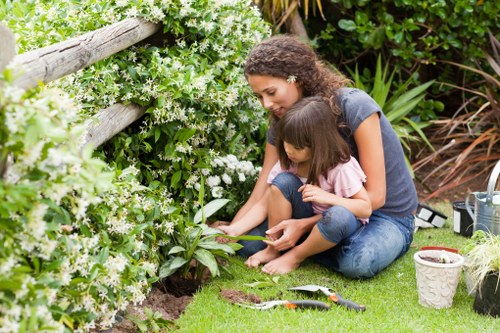Expert Guide to Garden Fence Installation in Sands End

Installing a garden fence in Sands End is a fantastic way to enhance the beauty, privacy, and security of your outdoor space. Whether you’re looking to define your garden boundaries, keep pets safe, or simply add a decorative touch, a well-installed fence can make a significant difference. In this guide, we will walk you through everything you need to know about garden fence installation in Sands End, ensuring that you make informed decisions and achieve the best results.
Firstly, understanding the different types of garden fences available is crucial. From wooden fences that offer a traditional look to metal and vinyl options that provide durability and low maintenance, there is a wide range of materials to suit every taste and budget. Each material has its own set of advantages and considerations, so it’s important to choose one that aligns with your specific needs.
Moreover, the installation process requires careful planning and execution. Factors such as the size of your garden, the existing landscape, and local regulations in Sands End can influence how you approach your fence installation. By taking these elements into account, you can ensure a smooth and efficient installation process.

Choosing the Right Fence Material
Selecting the appropriate material for your garden fence is a fundamental step in the installation process. Here are some popular options to consider:
- Wooden Fences: Offer a natural and classic appearance. They can be painted or stained to match your garden’s aesthetics.
- Metal Fences: Provide strength and security. Options include wrought iron, aluminum, and steel, each with its own benefits.
- Vinyl Fences: Known for their durability and low maintenance. They are resistant to weathering and come in various styles.
- Composite Fences: Made from a combination of materials, they offer the look of wood with enhanced longevity.
When selecting a material, consider factors such as maintenance requirements, longevity, cost, and how well it complements your garden’s design. For instance, wooden fences might require regular upkeep but offer a warm and inviting look, while metal fences are more durable but might require periodic painting to prevent rust.
Additionally, think about the height and style of the fence. A taller fence might be necessary for added privacy, while a decorative picket fence can enhance the visual appeal of your garden.

Planning Your Fence Installation
Proper planning is essential for a successful garden fence installation in Sands End. Start by measuring the perimeter of your garden to determine how much fencing material you will need. Consider the layout of your garden, existing structures, and any slopes or uneven terrain that might impact the installation process.
Next, check with local authorities in Sands End to understand any zoning laws or regulations that might affect your fence installation. This could include restrictions on fence height, materials, or placement, especially if you share boundaries with neighbors.
It’s also wise to mark the locations of underground utilities before digging any postholes. Contact utility companies to ensure you don’t accidentally damage any lines during the installation.

Installation Process
Once you’ve selected your materials and planned the layout, it’s time to move on to the installation process. Here are the key steps involved:
- Marking the Fence Line: Use stakes and a string line to outline where your fence will be installed. Ensure the line is straight and level.
- Digging Post Holes: The depth and width of the holes will depend on your fence type and height. Generally, holes should be about one-third the length of the fence post and spaced approximately 6-8 feet apart.
- Setting the Posts: Place the fence posts in the holes and fill them with concrete to provide stability. Allow the concrete to cure according to the manufacturer’s instructions.
- Attaching the Fence Panels: Once the posts are secure, attach the fence panels or rails between the posts. Use appropriate hardware to ensure the panels are firmly in place.
- Finishing Touches: Add any decorative elements, such as pickets or lattice, and apply a finish like paint or stain if using wooden materials.

Maintenance Tips for Longevity
To ensure your garden fence in Sands End remains in excellent condition, regular maintenance is essential. Here are some tips to help you maintain your fence:
- Inspect Regularly: Check for any signs of damage, such as broken boards or rusted metal sections, and address them promptly.
- Clean Your Fence: Remove dirt and debris regularly. For wooden fences, power washing can help keep them clean without causing damage.
- Repaint or Stain: Wooden fences may need to be repainted or restained every few years to protect them from the elements.
- Treat for Pests: Inspect wooden fences for signs of termites or other pests and treat them as necessary.
- Repair Damage: Fix any broken sections immediately to prevent further deterioration and maintain the fence’s structural integrity.
By following these maintenance practices, you can extend the life of your garden fence and keep it looking beautiful for years to come.
Local Considerations in Sands End
When installing a garden fence in Sands End, it's important to consider the local climate and environmental factors. Sands End experiences a temperate climate with moderate rainfall, which can affect the choice of fence materials. Wooden fences may require more maintenance to prevent rot and warping, while metal and vinyl options might offer better resistance to the local weather conditions.
Furthermore, the aesthetic of your fence should complement the unique character of Sands End. This area is known for its charming residential streets and historic architecture, so choosing a fence style that blends seamlessly with the surroundings is key. Whether you opt for a classic wooden picket fence or a sleek metal design, ensure it enhances the overall look of your garden and home.
Additionally, consider the proximity of your neighbors when installing a fence. Ensuring that your fence meets local height regulations and doesn’t encroach on neighboring properties will help maintain good relationships and avoid potential disputes.
Benefits of Installing a Garden Fence
Installing a garden fence in Sands End offers numerous benefits beyond just defining boundaries. Here are some of the key advantages:
- Privacy: A tall fence can provide much-needed privacy, allowing you to enjoy your garden without prying eyes.
- Security: A sturdy fence can deter intruders and keep pets and children safe within your garden area.
- Noise Reduction: A solid fence can help block out unwanted noise from nearby roads or neighbors, creating a more peaceful outdoor environment.
- Wind Protection: Fences can act as a barrier against strong winds, making your garden more comfortable and reducing damage to plants.
- Enhanced Curb Appeal: A well-designed fence can significantly improve the appearance of your property, increasing its overall value.
- Defined Spaces: Fences help define different areas within your garden, making it easier to organize and utilize the space effectively.
Choosing the Right Contractor
Selecting a reputable and experienced contractor is crucial for the success of your garden fence installation in Sands End. Here are some tips to help you choose the right professional:
- Experience: Look for contractors who have extensive experience in garden fence installation and a proven track record of successful projects in Sands End.
- Licenses and Insurance: Ensure the contractor holds the necessary licenses and insurance to protect you from any liabilities during the installation process.
- References: Ask for references or reviews from previous clients to gauge the quality of their work and customer satisfaction.
- Detailed Quotes: Obtain detailed estimates that outline all costs, materials, and timelines to avoid any hidden fees or surprises.
- Communication: Choose a contractor who communicates clearly and is responsive to your questions and concerns throughout the project.
By carefully selecting a qualified contractor, you can ensure a smooth and efficient fence installation process that meets your expectations and enhances your garden’s appeal.
Cost Considerations
The cost of installing a garden fence in Sands End can vary based on several factors, including the type of material, the size of the area, and the complexity of the installation. Here are some cost-related aspects to consider:
- Material Costs: Wooden fences tend to be more affordable upfront but may require more maintenance. Metal and vinyl fences might have a higher initial cost but offer greater durability and lower maintenance in the long run.
- Labor Costs: Hiring a professional contractor can add to the overall cost, but their expertise can ensure a high-quality installation.
- Additional Features: Custom designs, decorative elements, and gates can increase the cost of your fence installation.
- Permits: Depending on local regulations, you might need to obtain permits, which can incur additional fees.
On average, the cost of garden fence installation in Sands End can range from £50 to £150 per meter, depending on the materials and complexity of the project. It’s advisable to obtain multiple quotes and compare them to find the best value for your budget.
Environmental Impact and Sustainability
Considering the environmental impact of your garden fence is important for sustainability. Here are some ways to choose eco-friendly fencing options:
- Recycled Materials: Opt for fences made from recycled materials, such as reclaimed wood or recycled metal, to reduce waste and promote sustainability.
- Sustainable Sourcing: Choose wood from sustainably managed forests certified by organizations like the FSC (Forest Stewardship Council).
- Low-Emission Finishes: Use paints and stains with low volatile organic compounds (VOCs) to minimize environmental impact.
- Durable Materials: Investing in durable materials reduces the need for frequent replacements, thereby lowering your environmental footprint.
By selecting environmentally friendly fencing options, you contribute to the sustainability of Sands End and help preserve the natural beauty of your garden.
Local Areas for Garden Fence Installation Services
If you’re located in Sands End, you have access to a range of nearby areas that offer excellent garden fence installation services. Here are some of the closest areas to consider:
- Fulham Just north of Sands End, Fulham offers a variety of fencing contractors with extensive local experience.
- Hammersmith Known for its vibrant community, Hammersmith has numerous options for garden fence installation, catering to diverse styles and budgets.
- Putney: Putney residents can access top-rated fencing services that specialize in both traditional and contemporary designs.
- Chiswick Chiswick offers high-quality fencing solutions with a focus on craftsmanship and durability.
- West Kensington Close to Sands End, West Kensington provides a range of fencing materials and professional installation services.
- Baron’s Park: This area is home to several reputable fencing companies known for their reliable service and competitive pricing.
- Regent’s Park: Regent’s Park offers premium fencing options, including bespoke designs tailored to your garden’s specific needs.
- Wandsworth Wandsworth has a wealth of fencing contractors who can assist with both small and large-scale garden projects.
- Stamford Brook: Stamford Brook provides access to specialized fencing services that focus on quality and customer satisfaction.
- Putney Bridge: Located near the Thames, Putney Bridge offers professional fence installation with an emphasis on aesthetics and functionality.
- Palace Gate: Palace Gate is another nearby area with excellent fencing contractors capable of handling various types of installations.
- Southfields Southfields residents can benefit from experienced fence installers who understand the local landscape and requirements.
- Brackenbury: Brackenbury offers a range of fencing options, from simple privacy screens to elaborate decorative fences.
- Wandsworth Common: In close proximity to Sands End, Wandsworth Common has accessible fencing services that prioritize environmental sustainability.
Choosing a local fencing contractor from one of these nearby areas ensures that you receive personalized service and benefits from their knowledge of the Sands End community and its specific needs.
Final Thoughts
Garden fence installation in Sands End is a worthwhile investment that can significantly enhance the functionality and aesthetics of your outdoor space. By carefully selecting the right materials, planning meticulously, and choosing a reputable contractor, you can achieve a beautiful and durable fence that meets your needs.
Remember to consider local regulations, maintenance requirements, and environmental factors to ensure that your fence not only looks great but also stands the test of time. With the right approach, your garden fence will provide years of enjoyment, privacy, and security, making your Sands End home even more special.
Frequently Asked Questions
1. What is the average cost of installing a garden fence in Sands End?
The cost can vary depending on the material, size, and complexity of the installation. On average, you can expect to pay between £50 to £150 per meter.
2. How long does it take to install a garden fence?
The installation time depends on the size and type of fence, but typically, a standard garden fence can be installed within a few days.
3. Do I need a permit to install a garden fence in Sands End?
Local regulations may require permits for certain types of fences, especially regarding height and materials. It’s advisable to check with local authorities before starting your project.
4. What maintenance does a wooden fence require?
Wooden fences need regular maintenance, including cleaning, painting or staining, and inspections for rot or pests to ensure longevity.
5. Can I install a garden fence myself, or should I hire a professional?
While DIY installation is possible for those with the necessary skills and tools, hiring a professional contractor ensures a high-quality and durable installation, especially for larger or more complex projects.